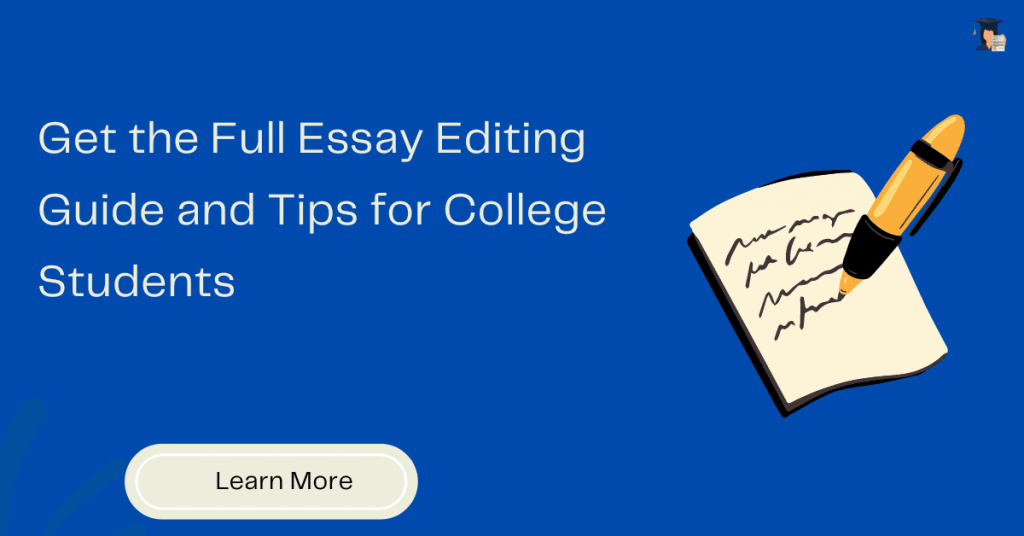What comes next after writing your essay? College essay editing is a crucial step after writing your essay draft. It involves reviewing and correcting errors before submission. The difference between a good paper and an ‘A’ paper is editing. By working on your editing techniques, you can refine your writing abilities, enhance your argumentation skills, and ultimately earn better grades. While editing is essential, it’s probably the hardest step. Therefore, our experienced editors have come up with a perfect essay editing checklist to walk you through it. Plus, it’s a great way to start the editing process, so you don’t miss anything important. Let’s get started!
Editing vs. revising vs. proofreading- Know the difference
“Proofreading,” “revising,” and “editing” are often used interchangeably. Still, they serve different purposes and require different approaches to improve your writing. Revision is about making structural and logical changes to your text, for example, reformulating arguments. In contrast, proofreading is about spotting and correcting minor errors that could change your work’s meaning. Finally, editing is a little bit of both but mainly involves changing sentence structure and phrases to ensure your point is conveyed.
Editing and Revising Checklist
Not many students like editing after spending a lot of time writing an essay; therefore, we’ve simplified the process and created an essay editing checklist that can guide you, as shown below.
Checklist for the Introduction
Here are important things to check when editing the introductory paragraph.
- Did you clearly state your thesis statement?
- Does your thesis statement answer the essay question?
- Does the thesis outline the main points of your essay?
- Do you clearly show the focus of your essay?
- Does your introduction grab the reader’s attention?
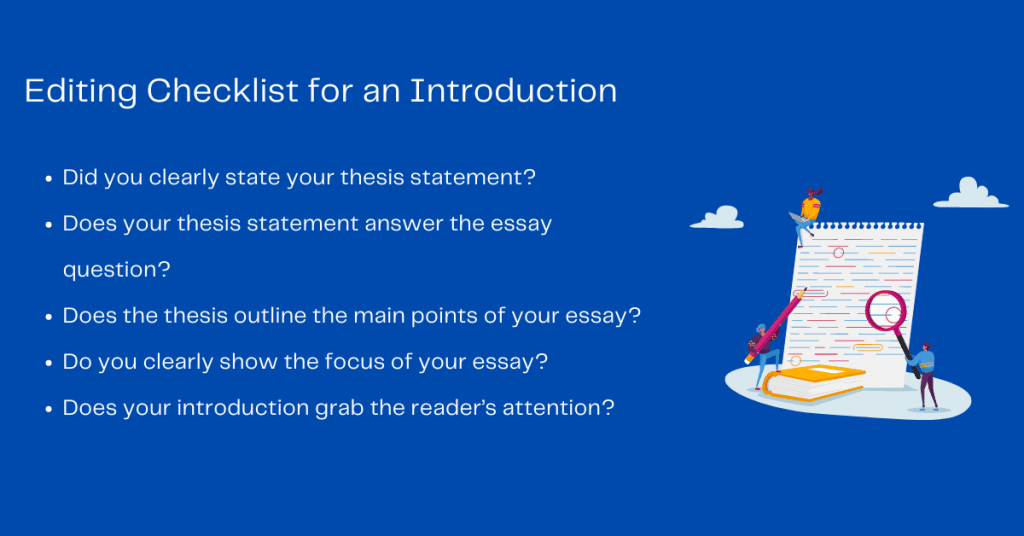
Body Paragraphs Editing Checklist
Listed below are some of the questions you should ask yourself when revising and editing your body paragraphs.
- Does every paragraph have a topic sentence where you clearly state the main idea?
- Does your paragraph support your topic sentence?
- Is the main idea of every paragraph relevant to the Essay question?
- Did you support your points with evidence or provide examples?
- Did you analyze your points rather than stating them?
- -Does the final sentence in each paragraph either summarize the paragraph or transition to the next point?
Conclusion Editing Checklist
The conclusion is the last section of your essay, here are the important things to lookout for when editing it.
- Did you restate the thesis statement mentioned in the Introduction?
- Did you briefly summarize your paper’s main argument and provide results?
- Did you make connections with the broader context?
- Is your tone confident so it does not weaken the result of your argument?
Paragraph and Sentence Structure checklist
To make sure each paragraphs and sentences are well organized and effective, look at each paragraph individually, examining the following elements:
- Do your paragraphs flow logically?
- Did you use transition words to make connections between sentences and paragraphs?
- Are your sentences clear, grammatically correct, and to the point?
- Are your sentences and ideas progressing logically?
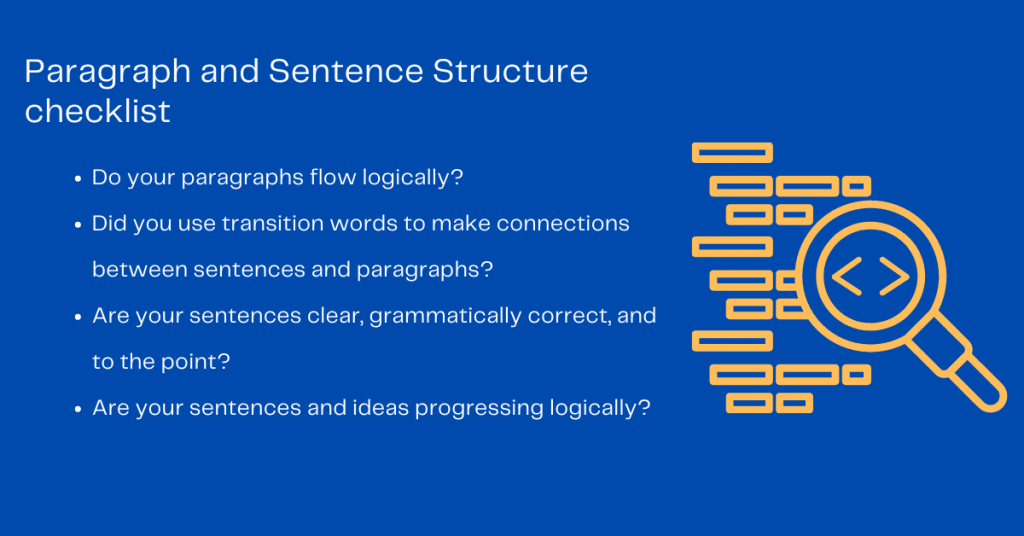
Word Count / Length Checklist
For any student out there, the word count for your essay is important. It can be the difference between a good grade and a great grade, or even getting the essay published in the first place. Base on the instructions here are things to look out for.
- Did you stick to your word limit?
- Are any of your paragraphs too short or too long?
- Does your Introduction have a suitable length?
- Have I included only relevant information?
- Is there any unnecessary repetition in my assignment?
Citation/ Referencing Checklist
The following questions will help you check if you have done your referencing right depending on the style you are required to use for your essay.
- Did you check which referencing style your school uses?
- Did you use reliable sources?
- Are all sources acknowledged?
- Are citations formatted correctly?
- Are ideas from other sources paraphrased or summarized adequately?
- Is the reference list complete and accurate?
- Is referencing consistent throughout the essay?
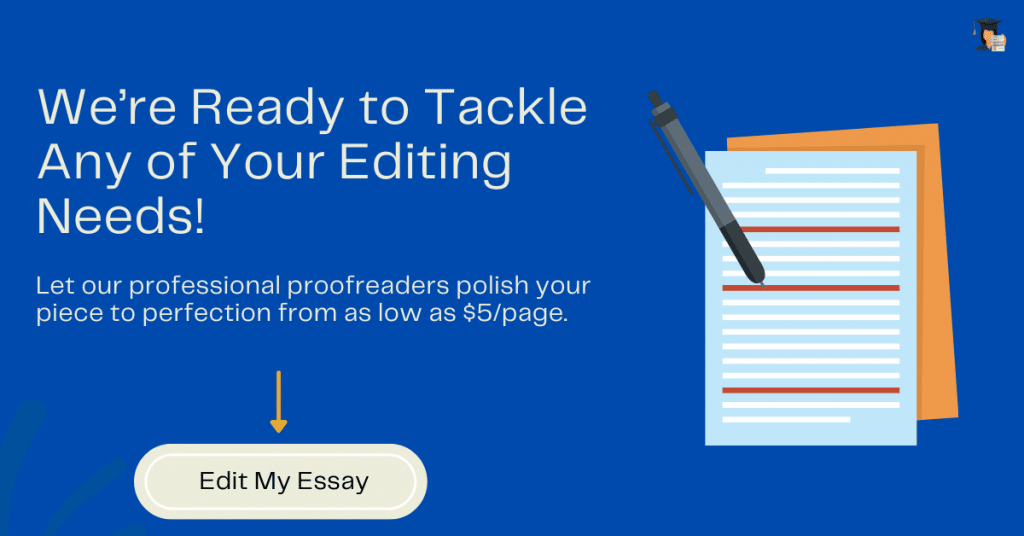
Proofreading Checklist
Proofreading is a skill you need to acquire to get better grades on your essay. Therefore, Use the following essay editing checklist when proofreading your work.
Grammar and Spelling Checklist
Below we’ve put together this essential grammar essay editing checklist for writing, to help improve your chances of getting things right first time around.
- Have I checked for grammatical errors? These may involve verb tenses, plurals, or prepositions.
- Do you have spelling errors and inconsistencies?
- Did you check for typos related to punctuation, such as comma splices, missing full stops, or incorrect use of quotation marks?
- Do you have errors or clarity issues related to grammar, such as sentence fragments?
- Do you have Incorrect or inconsistent capitalization?
Punctuation Checklist
- Is punctuation correct?
- Do you have misplaced hyphens?
- Are there commas with restrictive elements?
Choice of words Checklist
- Is your wording straightforward?
- Are you sure of the definitions of the words used?
- Can you replace any word with one that is more precise?
- Have you left out any important words?
- Have you included words you meant to delete?
- Did you avoid jargon that might be unfamiliar to your reader?
- Do you avoid clichés and overused expressions?
- Have you eliminated unnecessary adjectives and adverbs?
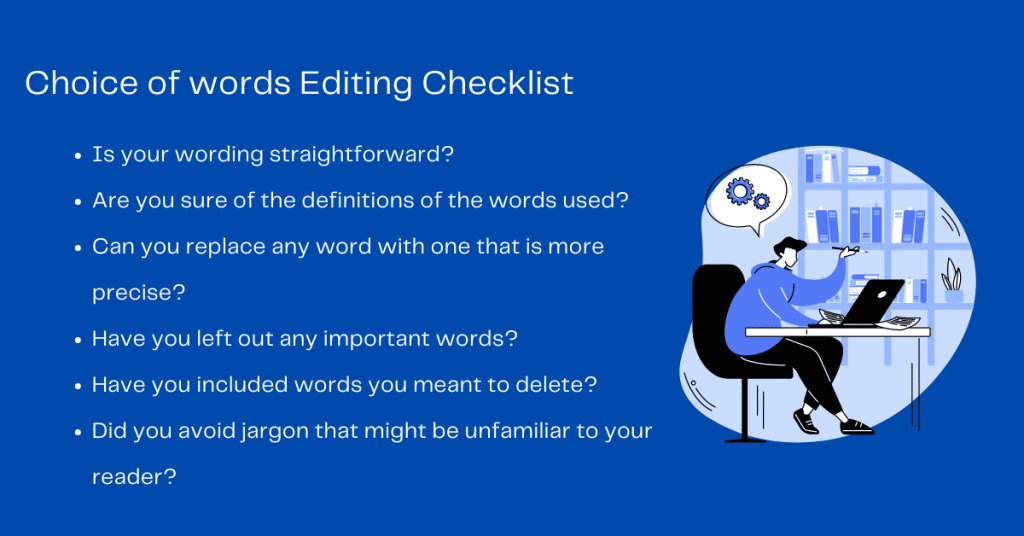
Tone and style
- Did you use slang and other informal languages?
- Do you have Inappropriate use of the first person or other subjective languages?
- Is there repetition?
- Did you use gendered or biased language?
- Are there incorrectly used abbreviations?
- Do you have overly complex or flowery language?
- Did you use passive or active voice?
- Is there Inappropriate use of quotations and paraphrases?
Verb Tense usage
- Do your verb tenses match the academic discipline of the assignment? For example, Past tense is used for History.
- Are your verb tenses consistent?
- Have you replaced unnecessary verbs like ‘to be’ with stronger verbs?
- Are you using active verbs? Passive verbs are acceptable only when the object requires emphasis in a sentence.
8 Tips to Consider When Editing Your College Essay
Editing your college essay can feel like a bore for many students, but it’s essential to ensure that your essay is the best it can be before you submit it. Therefore, consider the following points when using your essay editing checklist.
List the Essay Requirements
The list of requirements includes word count, style appropriateness, formatting requirements, correct citations, and any specific instructions from your professor. This List will help you focus on your editing and ensure you don’t overlook essential aspects. It can also keep you on track if you feel overwhelmed by the editing process. Therefore, before you turn in your essay, look at the prompt again.
Take a Break After Writing
After writing your college essay, taking a break before you start editing is essential. This will help you return to your paper with fresh eyes, making it easier to spot and correct errors. When you’ve been looking at your essay for a long time, it’s easy to miss things because you’re familiar with the material. Therefore, you tend to skim through it, overlooking common errors. So, ensure you give yourself a break to edit more effectively.
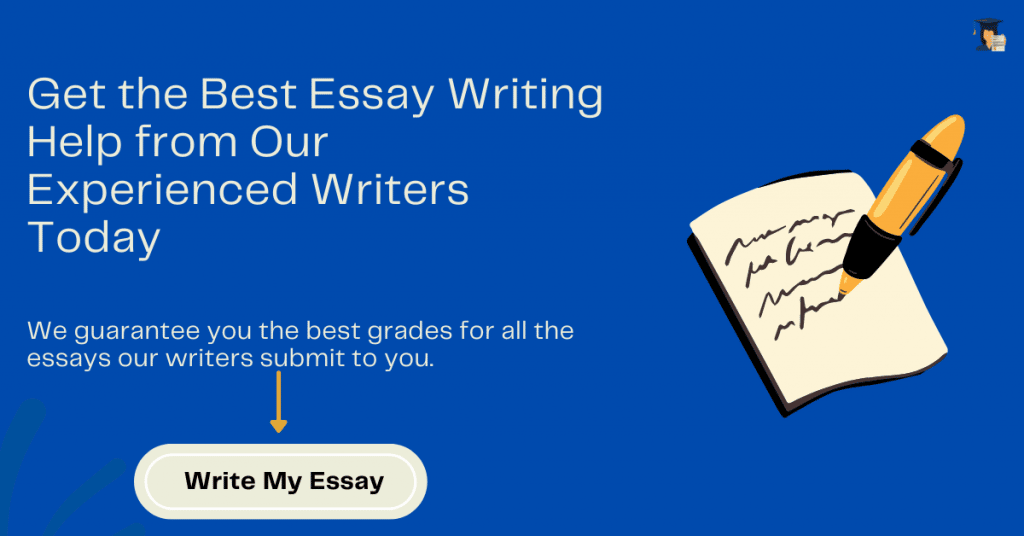
Read Your Essay Out Loud
Anytime you sit down to edit your college essay, it’s a good idea to read it out loud because it helps you catch errors you might not have noticed. When you read silently, your brain skims over incorrect words and sentences because it can automatically fill in the correct information, which is not the case when reading aloud. In addition, it can help you understand how your essay flows and whether or not it sounds natural. You can read out loud to yourself in a quiet room or to a group of people, and you’ll notice wordy or awkward sentences and issues with language and tone, which you can easily correct.
Print Your Essay
Many students prefer to edit their college papers on the computer. After all, it’s easy to make changes and track your progress when you can see your essay on the screen. However, printing your paper is beneficial because it’s easier to catch typos and grammar mistakes when looking at a hard copy. Additionally, it can help you better understand its overall organization and flow. It also allows you to see the words differently, especially if the font is different.
Proofread With With Different Eyes
It’s easy to burn yourself out reading the same pages repeatedly. Therefore, having a fresh pair of eyes look at your paper is crucial because it’s easy to miss your own mistakes since you’re familiar with the material. In addition, another person can help you see your paper from a different perspective and offer suggestions which can be very helpful in making sure that your argument is clear and concise. Therefore, you need an outside source of help who knows the subject matter and has good editing skills.
Edit More than once
If you want to ensure your essay is the best, you should edit it several times: here are some editing guidelines:
- Do a global edit. This is where you look at the whole paper and ensure it makes sense and flows well.
- Do a line edit where you look at each sentence individually and ensure it’s clear and error-free.
- Proofread to fix any typos or grammatical errors.
Read the essay backward
This is a helpful technique, especially when you’re editing grammar errors. By reading backward, you can focus on each word and sentence rather than getting caught up in the essay context. This strategy helps you see sentences; hence you catch minor grammatical errors that you might otherwise overlook. In addition, it helps you identify awkward phrasing and sentence fragments. Usually, this strategy is not fun because it is time-consuming and requires a lot of attention; however, the final results make it worth it.
Get advice from a writing expert
All students want their essays to be perfect before submission, but you may not know where to start. Therefore, you should seek out the advice of a writing expert. A writing expert can help you identify any areas that need improvement and suggest how to fix them, allowing you to strengthen your argument and improve your overall writing style. With the help of a writing expert, you can be confident that your essay will be the best.
Conclusion
Editing your college essay can seem daunting, but it’s a process worth taking the time to do correctly. We hope our essay editing checklist has given you an idea of the best editing process. At Bright Writers, our essay writing and editing team consists of experienced professionals who can help write and polish your essay.
FAQs
How do you properly edit an essay?
- Read Your Essay Out Loud
- Proofread With Different Eyes
- Edit More than once
- Read the essay backward
- Get advice from a writing expert
How do you use checklist editing?
You use it to edit errors or mistakes in an established order so that no step is forgotten.
What is an editing checklist?
An essay editing checklist is a list of guidelines that lists all issues to check for while reviewing your paper.


